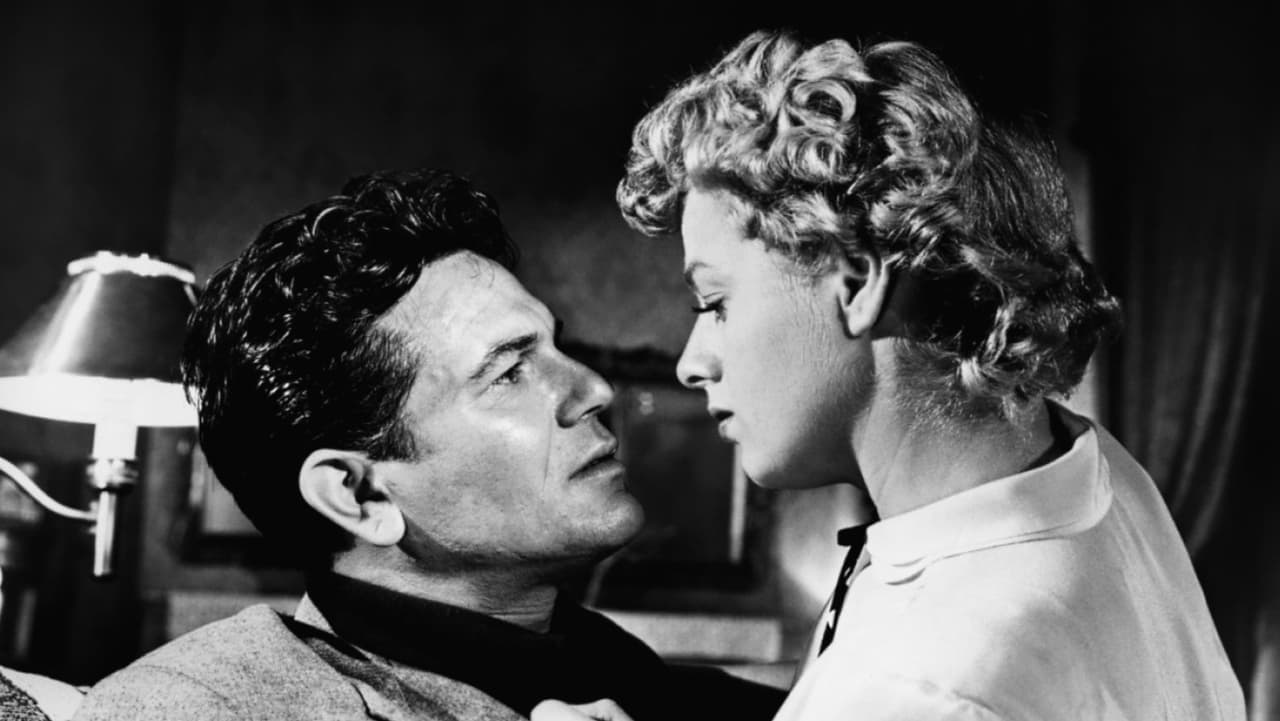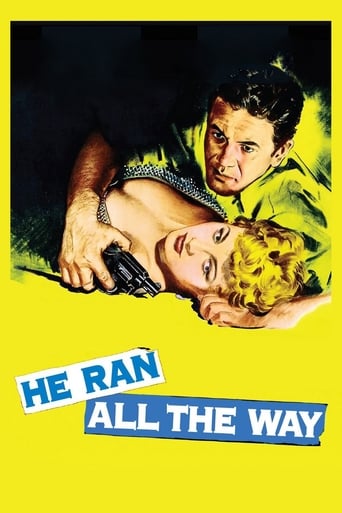

Intense, gripping, stylish and poignant
... View MoreThis movie was so-so. It had it's moments, but wasn't the greatest.
... View MoreTrue to its essence, the characters remain on the same line and manage to entertain the viewer, each highlighting their own distinctive qualities or touches.
... View MoreThere are moments that feel comical, some horrific, and some downright inspiring but the tonal shifts hardly matter as the end results come to a film that's perfect for this time.
... View MoreCopyright 13 July 1951 by Roberts Pictures, Inc. A production of Enterprise Studios released through United Artists. U.S. release: 13 July 1951. New York opening at the Paramount: 20 June 1951. U.K. release: 22 October 1951. Australian release: 7 December 1951. Running time varies: 78 minutes (U.S.); 79 minutes (Australia); 80 minutes (U.K.).SYNOPSIS: Mixed-up fugitive killer forces an average New York family to hide him in their home.NOTES: Garfield's last film. Although he testified before the House Committee on Un-American Activities in 1951 as a "co-operative witness", he refused to name names and was black-listed in Hollywood. He returned to New York where he starred in the successful 1952 revival of Clifford Odets' Golden Boy on Broadway. He died of cardiac arrest in the house of a friend at Gramercy Park on Wednesday morning, 21 May 1952. He was 39 or 40 years old.The names of director John Berry and co-screenwriter Hugo Butler were removed from the film shortly after its release, due to black-listing.Domestic gross: $849,465.32.COMMENT: Not by any means the minor film, casually dismissed by many critics. Screenwriters Endore and Butler have attempted to bring off a difficult feat. The action highlight of the film (an excitingly staged pay-roll robbery) takes place in the very first reel. Thereafter the script could well have petered out in a boring anti-climax. That it does not is due as much to the taut, believable writing as to skilled playing and tight direction.Garfield, in a tailor-made role, gives almost the epitome Garfield portrayal. His Nick Robey is a born loser, at odds not only with society and his surroundings, but with himself. Shelley Winters, in a complex, well-motivated role, is a believably sympathetic counterpoint. Wallace Ford and Gladys George are also most effective - as is the great Norman Lloyd in all-too-brief spot as Garfield's partner. The script provides each of these players with finely rounded characterizations.If the basic situation is now thoroughly familiar (thanks to Desperate Hours and numerous spin-offs), it still has a freshness and vibrancy here that make its imitators look stodgy and slow. The pace is fast, the editing crisp. Moreover, director, photographer and production designer have a genuine feel for the realistic locations and know how to use them atmospherically and effectively. The sharp, moody black-and-white cinematography is the work of James Wong Howe.OTHER VIEWS: "Without doubt, Garfield's single most impressive performance on film." - Howard Gelman, The Films of John Garfield."One of the very best pictures I have done." - James Wong Howe in Hollywood Cameramen by Charles Higham.
... View MoreSmall-time hood (John Garfield), on the run after shooting a cop during a robbery, meets an unsuspecting girl (Shelley Winters) who invites him back to her apartment. There he takes her and her family hostage while he figures out his next move.John Garfield's last film features another fine performance from him. This probably wasn't a very challenging role for Garfield. It's similar to the types of roles he played early in his career. Perhaps a little edgier and lacking charm or humor. This character's a paranoid wreck. The rest of the cast is good, with Wallace Ford a standout as Winters' father. It's a decent thriller with a fairly routine plot, elevated by the James Wong Howe photography and an exciting score by Franz Waxman.
... View MoreThe picture starts with Nick (this is last movie of John Garfield ) and his colleague Al Molin (Norman Lloyd) stage a payroll holdup . Al is murdered, along with a police officer . Nick hides out in a plunge , and into a locker hides the robbed cash ; later on , he meets Peg Dobbs (Shelley Winters) . They go out from a public pool and return to her apartment and then Nick forces her family , father (Wallace Ford , John Ford's brother) , mother (Selena Royle) and child to hide him from the police chase .This enjoyable film contains a relentless manhunt , thrills , suspense , violence and some elements of Noir cinema . Most actors , screenwriters , director were pursued by American government during ominous period of Mccarthismo. Interesting writing credits , written under pseudonyms , by Dalton Trumbo and Hugo Butler , front Guy Endore ; being based on a novel by Sam Ross . Very good acting by John Garfield as a violent and desperado delinquent . Garfield had a sad as well fruitful life , as he signed a contract with Warner Brothers, who changed his name to John Garfield. Won enormous praise for his role of the cynical Mickey Borden in Four Daughters (1938). Appeared in similar roles throughout his career despite his efforts to play varied parts , being his best film : Body and soul . Active in liberal political and social causes, he found himself embroiled in Communist scare of the late 1940s. Though he testified before Congress that he was never a Communist, his ability to get work declined. While separated from his wife, he succumbed to long-term heart problems, dying suddenly in the home of a woman friend at 39. His funeral was mobbed by thousands of fans, in the largest funeral attendance for an actor since Rudolph Valentino.Atmosheric and appropriate cinematography in black and white by James Wong Howe who along with John Alton and Nicolas Musuraka are the main cameramen of Noir genre . Thrilling as well as evocative musical score by the classic Franz Waxman . The motion picture was well directed by John Berry . Director John Berry and co-scripter Hugo Butler's names were removed from the credits for a time after release, due to the blacklisting of supposed Communist sympathizers at the time. Assistant director Emmett Emerson is thus often credited as the film's director . Berry Was named as a member of the Communist Party by Hollywood 10 member Edward Dmytryk in Dmytryk's 1951 testimony before the House Un-American Activities Committee, when the blacklisted director "named names" to revive his Hollywood career and effect a return from exile in Europe. After Dymytrk's testimony, the formerly disgraced director, who had served a prison term for defying HUAC in 1947, was allowed to resume his Hollywood career and direct movies in America, but Berry was blacklisted and went into exile in France. Ironically, Berry had directed the documentary The Hollywood Ten . Berry directed interesting films , such as 1955 Headlines of Destruction , 1949 Tension 1949 , 1948 Casbah ,1946 Cross My Heart and 1946 From This Day Forward , among others .
... View MoreThe opening chase through the streets and rail yards of LA is dynamically filmed as Garfield flees after killing a cop in a holdup. The pool scene, where he hides out, may not make much sense (why risk the money being stolen from the locker), but is an unusual and eye-catching venue. However, once the movie sets up shop in the Winters family apartment, the dynamism subsides and I'm reminded of one of those Playhouse 90 melodramas of the time. They were interesting stage plays for TV, but too static for a screenplay. And despite director Berry's efforts to build tension from the resulting hostage situation, the film never regains the earlier momentum.What the movie does have is the great John Garfield in unfortunately his last role. Frankly he doesn't look well, but still manages a dynamic performance, without which the film would totally collapse. Snarling one moment and cooing the next, he's still believable as a cynical gunman torn between softer fellow feelings and a desperate sense of survival. The suspense comes from not knowing which side will ultimately dominate. Unfortunately, Shelley Winters plays the hapless girl he picks up at the pool. She's supposed to be emotionally vulnerable, which she is at first, but Winters has a hard time being vulnerable without being pathetic ( for example, "A Place in the Sun", 1951). Thus she soon becomes more annoying than sympathetic. The climax is nicely ironical, yet fails to help move the proceedings beyond the programmer stage. Too bad that Garfield didn't clock out on the wings of a more memorable movie.
... View More